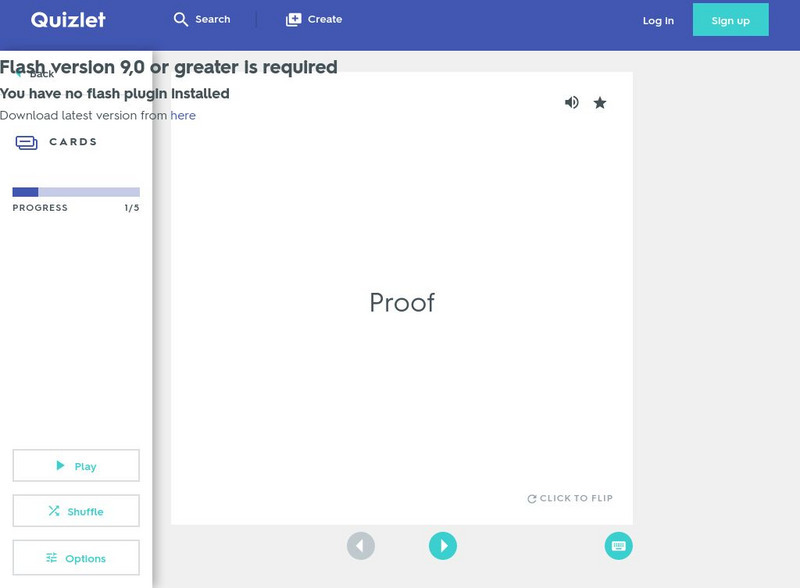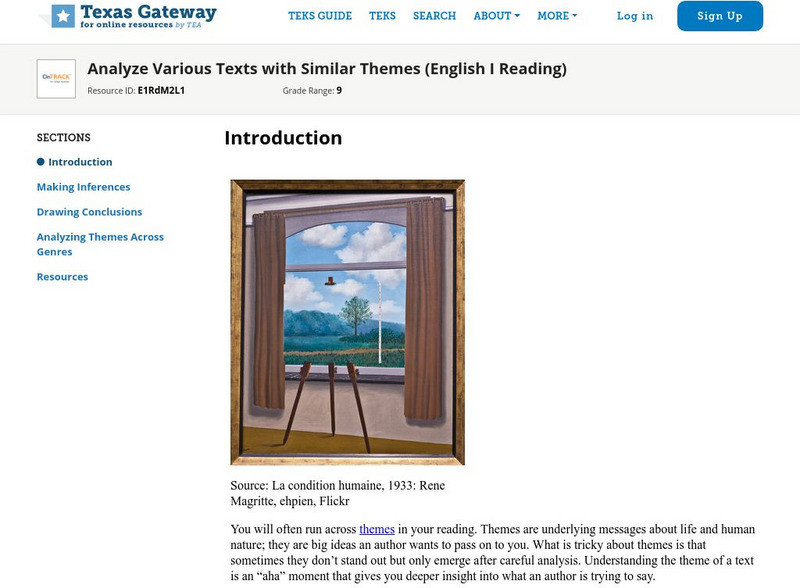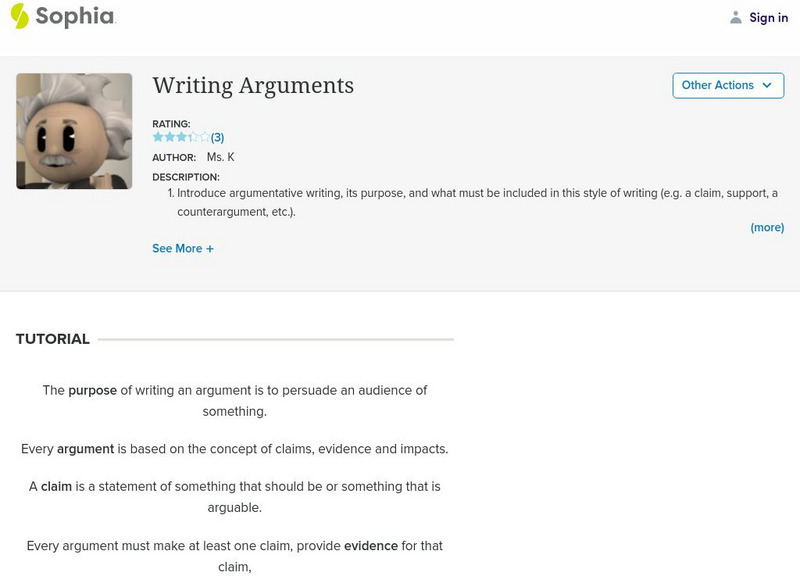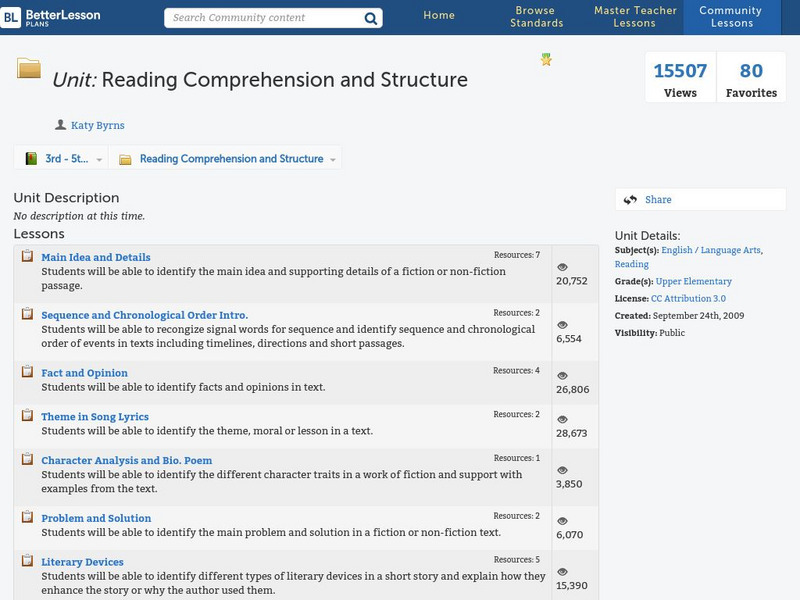ClassFlow
Class Flow: Finding the Main Idea & Inferences
[Free Registration/Login Required] This flipchart will help student find the main idea in writing as well as make inferences while reading. There are 2 web quests embedded that has numerous exercises with sound. There is an Activote...
Better Lesson
Better Lesson: What the Heck Is That? Inferring the Purpose of an Object
In this lesson, 5th graders use their prior knowledge and inference skills to determine uses of unfamiliar objects. They participate in group discussions and analyze the key information they have in order to reach conclusions.
Polk Brothers Foundation Center for Urban Education at DePaul University
Depaul University: Center for Urban Education: I Can Make an Inference [Pdf]
Students can use this graphic organizer to help them make inferences about the information in a text and then explain the rationale for each.
SMART Technologies
Smart: Making Inferences
Inferencing is finding clues and using background knowledge to determine an explanation from facts in a passage or story. It's "reading between the lines" of a story to understand what the author doesn't state.
Quizlet
Quizlet: Flashcards 8th Grade Evidence/inference
This set of interactive flashcards focuses on terms having to do with evidence and inference-related definitions. These terms include the following: evidence, analysis, inferences, explicit, and imply.
Texas Education Agency
Texas Gateway: Understanding Drama
You will learn how to make complex inferences in a play and use textual evidence to support your understanding.
Polk Brothers Foundation Center for Urban Education at DePaul University
De Paul University: Center for Urban Education: Identify/infer Character Traits [Pdf]
This page contains links for three graphic organizers. Students will use graphic organizers to identify character traits, infer character traits, and support inferences with text evidence.
AdLit
Ad lit.org: Classroom Strategies: Inferential Reading
Teaching students to "read influentially" helps them learn how to read more strategically. This technique is derived from the teaching model that learners develop knowledge via the process of interpreting new information in light of past...
Polk Brothers Foundation Center for Urban Education at DePaul University
De Paul University: Center for Urban Education: Harold Washington's Speech [Pdf]
"Harold Washington's Acceptance Speech" is a one page, excerpt from a speech given by Harold Washington after being elected as mayor of Chicago on April 12, 1983. It is followed by constructed-response questions which require students to...
E Reading Worksheets
E Reading Worksheets: Implicit Character Traits Worksheet
In this learning module, students will practice making inferences about character traits. A worksheet is provided to practice with finding implicit character traits. This module is designed to support Tier I, Tier II, and Tier III students.
Read Works
Read Works: Predicting 1st Grade Unit
[Free Registration/Login Required] A two-lesson unit designed to teach students to make predictions and support them with details from the text. Lessons are based on the books Wemberly Worried by Kevin Henkes and No Roses for Harry! by...
Quizlet
Quizlet: Main Idea, Main Idea Match
Terms related to main idea are included in this review "Match" game. Questions are provided for the following words: central idea, main idea, conclusion, infer, inferences, interesting detail, subject, summarizing, and supporting detail....
Texas Education Agency
Texas Gateway: Analyze Various Texts With Similar Themes (English I Reading)
You will learn how to make inferences and draw conclusions about similar themes in various texts by finding supporting evidence within the texts.
E Reading Worksheets
E Reading Worksheets: Making Predictions Worksheets and Lessons
In this learning module, students will learn more about making predictions in reading. Worksheets and a leson are provided to support Tier I, Tier II, and Tier III students.
Quizlet
Quizlet: Main Idea and Details 2nd Grade Match
Identifying the main idea is the task for this "Match" game. Students will read a series of details and match the main idea that "matches" the list of supporting details.
Sophia Learning
Sophia: Critical Reading as a Learning Strategy
This tutorial focuses on critical reading using a downloadable PowerPoint presentation, "Critical Reading 101," which includes separating fact from opinion, 6 propaganda techniques, and 6 common fallacies in reasoning. Also provided is...
Sophia Learning
Sophia: Writing Arguments
This tutorial focuses on argumentative and persuasive writing: it lists and defines the components of arguments, provides a flow chart for argumentative writing, defines counterarguments, and lists the 3 elements of persuasion: ethos,...
PBS
Pbs Learning Media: Molly of Denali: A Splash of Mink Lesson Plan
In the animated 11-minute story "A Splash of Mink," from the PBS KIDS series MOLLY OF DENALI, Molly and Trini must find a remedy after being sprayed by a mink. Despite getting advice from various sources about how to get rid of the...
Louisiana Department of Education
Louisiana Doe: Louisiana Believes: Eureka Math Parent Guide: Statistics and Probability
A guide to support parents as they work with their students in statistics and probability.
Better Lesson
Better Lesson: Unit: Reading Comprehension and Structure
This unit focuses on reading comprehension and structure. It includes lessons on the main idea and supporting details, theme, sequence, fact and opinion, literary devices, character, text features, inferences, organization of nonfiction,...
Scholastic
Scholastic: Informational Text: Reading Response: Claim Evldence Reasoning [Pdf]
This graphic organizer can be used with students when they read informational text. Students will identify a claim, list text evidence that supports the claim, and explain how the information can be used for their future understanding of...
E Reading Worksheets
E Reading Worksheets: Characterization Group Project
In this learning module, students will learn more about characterization. Worksheets are provided to reinforce the understanding of character traits. This module is designed to support Tier I, Tier II, and Tier III students.
Polk Brothers Foundation Center for Urban Education at DePaul University
De Paul University: Center for Urban Education: Changing Our Street [Pdf]
"Changing Our Street" is a one page, realistic fiction, reading passage about how the problem of people driving too fast in a neighborhood was solved. It is followed by constructed-response questions which require students to provide...
Polk Brothers Foundation Center for Urban Education at DePaul University
De Paul University: Center for Urban Education: Making Progress [Pdf]
"Making Progress" is a one page, fictional, reading passage about students clearing the trash from a vacant lot near the school and planting a garden to beautify the neighborhood and show they care. It is followed by constructed-response...




![Depaul University: Center for Urban Education: I Can Make an Inference [Pdf] Graphic Depaul University: Center for Urban Education: I Can Make an Inference [Pdf] Graphic](https://d15y2dacu3jp90.cloudfront.net/images/attachment_defaults/resource/large/FPO-knovation.png)



![De Paul University: Center for Urban Education: Identify/infer Character Traits [Pdf] Graphic De Paul University: Center for Urban Education: Identify/infer Character Traits [Pdf] Graphic](https://content.lessonplanet.com/knovation/original/119983-62ee3880b7ac71dbc7bc636a19f336da.jpg?1661787060)






![Scholastic: Informational Text: Reading Response: Claim Evldence Reasoning [Pdf] Graphic Scholastic: Informational Text: Reading Response: Claim Evldence Reasoning [Pdf] Graphic](https://content.lessonplanet.com/knovation/original/244734-74184753ee53d6872b10ba36f1639585.jpg?1661510818)